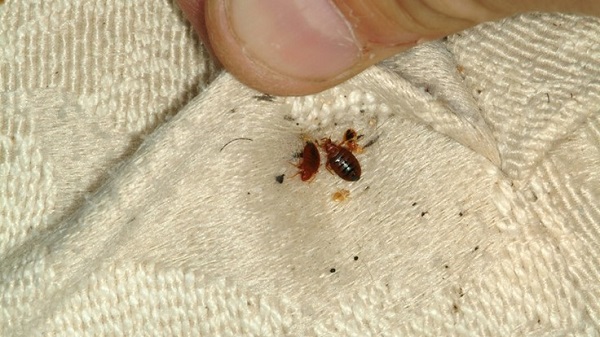Amazing Bed Bug Exterminator Treatment in Houston: Top Quality and Integrity
Amazing Bed Bug Exterminator Treatment in Houston: Top Quality and Integrity
Blog Article
Effective Parasite Control Measures to Safeguard Your Garden and Plants
In the world of gardening, the harmony of a well-tended yard can frequently be disrupted by unwanted parasites that intimidate the wellness and vigor of plants. As gardeners strive to keep a prospering outside area, the challenge of parasite control becomes a vital aspect of their gardening undertakings. Executing effective parasite control determines not only safeguards the yard's aesthetic appeal yet likewise plays a critical duty in maintaining the plants' well-being. By exploring a variety of strategies that incorporate all-natural repellents, valuable insects, buddy growing, do it yourself options, and environmentally-friendly pesticides, garden enthusiasts can navigate the detailed world of parasite administration with accuracy and care.
Natural Bug Repellents

Another effective natural parasite repellent is diatomaceous planet, a grainy compound made from fossilized water organisms. Diatomaceous planet jobs by literally hurting bugs with its abrasive texture, making it an excellent alternative for regulating bugs like slugs, beetles, and caterpillars. Furthermore, planting companion plants like marigolds, lavender, or basil can aid repel parasites as a result of their solid scents or all-natural chemical substances.
Beneficial Insects for Pest Control

One more useful pest is the parasitic wasp, which lays its eggs inside parasite insects, ultimately eliminating them. Ground beetles are outstanding for regulating caterpillars, snails, and slugs. Hoverflies, usually incorrect for due to their similar appearance, feed on aphids, thrips, and caterpillars.
To bring in useful insects to your yard, you can plant a diverse variety of flowering plants, such as dill, fennel, and yarrow, which offer nectar and pollen for grown-up pests. Additionally, prevent making use of broad-spectrum pesticides that can harm both dangerous and beneficial insects. By producing an inviting setting for these beneficial bugs, you can minimize the demand for chemical pesticides and advertise a healthier, a lot more well balanced yard ecological community.
Companion Planting Techniques
When aiming to improve the performance of valuable pests in your yard for all-natural pest control, considering companion planting strategies can even more optimize the ecological community equilibrium. Friend growing entails purposefully positioning particular plants beside each various other to optimize their shared advantages, such as preventing parasites, bring in valuable pests, this or boosting nutrient uptake - bed bug exterminator houston near me. One popular example is growing marigolds along with tomatoes to drive away nematodes and various other harmful pests while additionally bring in pollinators
Furthermore, integrating aromatic herbs like official site basil, mint, or rosemary in between veggie rows can assist prevent insects with their strong scents. An additional efficient technique is planting blossoms such as sunflowers, zinnias, or cosmos to attract pollinators like and butterflies, which consequently can help in pollinating your fruit and vegetable plants. Planting catch crops like nasturtiums can draw away bugs away from your main crops, offering as sacrificial plants that secure your useful produce. By carrying out buddy planting approaches, you can produce a varied and harmonious garden environment that naturally manages insects while advertising plant wellness and productivity.
DIY Insect Control Solutions
To properly handle bugs in your yard, executing diy parasite control remedies can be a cost-efficient and eco-friendly technique. One usual DIY insect control option is developing homemade insecticidal soaps by mixing moderate soap with water to manage soft-bodied pests like aphids, termites, and whiteflies. In addition, introducing helpful insects such as ladybugs, lacewings, and predative wasps can aid naturally control insect populations in your garden. Establishing physical obstacles like row covers or netting can additionally prevent insects like caterpillars from harming your plants.
Friend planting particular herbs and blossoms like marigolds, basil, and lavender can help repel parasites and attract beneficial pests. By integrating these Do it yourself insect control solutions right into your gardening regimen, you can safeguard your garden and plants without counting on severe chemicals.
Environmentally-Friendly Pesticides

An additional efficient choice is diatomaceous earth, a natural material made from fossilized water organisms, which can be sprinkled around plants to control slugs, snails, and various other creeping bugs. Furthermore, insecticidal soaps and oils derived from plant-based sources serve for controlling soft-bodied pests like aphids, termites, and whiteflies.
Verdict
To conclude, effective parasite control procedures such as natural repellents, beneficial pests, buddy planting approaches, do it yourself services, and environmentally-friendly chemicals are vital for securing your garden and plants. By applying these techniques, you can prevent damages caused by parasites and preserve a healthy and balanced and successful yard community. It is necessary to take into consideration the long-term influence of using chemicals and select even more sustainable and eco-friendly choices to guarantee the wellness and well-being of your plants and the setting.
Report this page